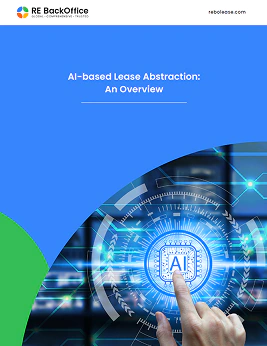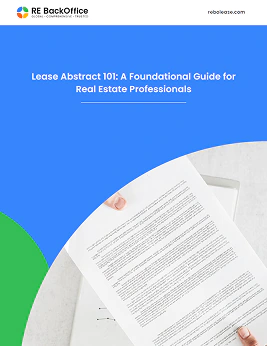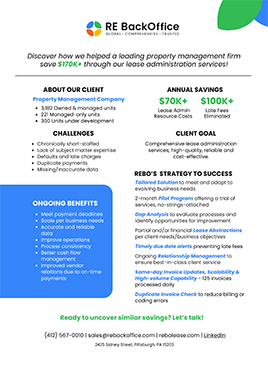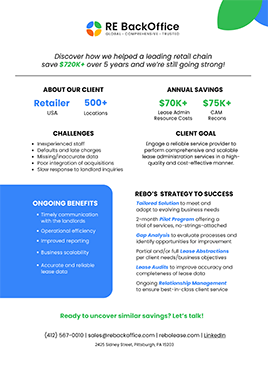
Lease administration has traditionally been a complex and resource-intensive function involving contract management, compliance tracking, financial reporting, and tenant-landlord communications. With the rise of artificial intelligence (AI), companies are increasingly leveraging technology to enhance accuracy, streamline operations, and reduce manual effort in lease administration.
AI-driven solutions are transforming the way businesses manage leases by automating data extraction, improving compliance monitoring, and optimizing financial processes. In this article, we will explore the role of AI in lease administration, the key benefits it offers, and how organizations can implement AI-driven solutions to enhance their lease management processes.
The Growing Need for AI in Lease Administration
Lease administration involves the management of critical lease documents, including tracking obligations, renewals, and financial commitments. Traditionally, lease administration has been highly manual, making it prone to human errors, inefficiencies, and compliance risks. Some of the key challenges include:
- Data Overload: Businesses manage thousands of lease documents, requiring constant updates and monitoring.
- Regulatory Compliance: Evolving lease accounting standards such as ASC 842 and IFRS 16 require accurate tracking of lease liabilities.
- Human Errors: Manual data entry and contract interpretation can lead to costly mistakes.
- Time-Consuming Audits: Lease audits and reconciliations demand extensive manual effort.
- Contract Ambiguities: Legal language in lease agreements can be complex and subject to misinterpretation.
To overcome these challenges, lease administration solutions offer automation, predictive analytics, and intelligent data management, allowing organizations to optimize lease processes while ensuring compliance and cost efficiency.
Key AI Technologies Transforming Lease Administration
AI in lease administration relies on multiple technologies to drive automation and accuracy. The key AI-driven technologies include:
1. Natural Language Processing (NLP) for Lease Abstraction
Natural Language Processing (NLP) enables AI to extract critical information from lease agreements. NLP-powered tools can:
- Automatically identify key lease terms such as rent escalations, renewal clauses, and termination dates.
- Standardize lease data by converting unstructured contract text into structured datasets.
- Reduce human effort required for reviewing and interpreting lease agreements.
2. Optical Character Recognition (OCR) for Document Digitization
OCR technology is essential for converting scanned lease agreements into searchable, structured digital records. OCR-powered AI systems can:
- Extract key lease data from PDF files, images, and handwritten contracts.
- Improve accuracy in capturing financial obligations, legal clauses, and renewal dates.
- Enable seamless integration with lease management software.
3. Machine Learning (ML) for Predictive Analytics
Machine learning algorithms enhance decision-making by identifying patterns in lease data. Lease administration offers:
- Predictive Rent Forecasting: Analyzing market trends to predict future lease costs.
- Risk Assessment: Identifying lease clauses that pose compliance or financial risks.
- Anomaly Detection: Spotting discrepancies in lease invoices and payments.
4. AI-Powered Chatbots for Lease Query Resolution
AI-driven chatbots assist lease administrators and tenants by answering lease-related queries in real-time. These chatbots can:
- Provide instant responses to lease-related questions.
- Automate tenant communication regarding lease terms, payments, and renewals.
- Reduce the workload on lease administrators.
5. Robotic Process Automation (RPA) for Workflow Automation
RPA enhances efficiency by automating repetitive lease administration tasks. AI-powered RPA bots can:
- Automate lease data entry and updates in lease management software.
- Send automated alerts for upcoming lease renewals and payments.
- Streamline compliance tracking by cross-checking lease terms with regulatory requirements.
Key Benefits of AI in Lease Administration
1. Enhanced Accuracy and Reduced Errors
AI-driven lease administration minimizes human errors by automating data extraction and verification. This ensures that critical lease details, such as payment obligations and renewal terms, are accurately recorded.
2. Improved Compliance with Lease Accounting Standards
AI ensures compliance with global lease accounting standards such as:
- ASC 842 (U.S. GAAP) – AI automatically calculates lease liabilities and right-of-use (ROU) assets.
- IFRS 16 (International Standard) – AI classifies leases and automates compliance reporting.
- Automated compliance tracking helps organizations avoid penalties and ensures regulatory adherence.
3. Cost Savings and Operational Efficiency
AI reduces manual effort, enabling lease administrators to focus on strategic tasks rather than data entry and document review. Automated workflows lead to:
- Faster Lease Abstraction: AI can process thousands of lease documents in minutes.
- Reduced Administrative Costs: Organizations save on labor-intensive tasks.
- Optimized Lease Renewals: AI provides insights on cost-effective renewal strategies.
4. Faster Lease Audits and Reconciliations
Lease audits require extensive data validation. AI-powered tools streamline this process by:
- Automatically matching lease invoices with contractual terms.
- Identifying discrepancies in lease payments.
- Generating real-time audit trails for financial teams.
5. Smarter Decision-Making with Predictive Insights
AI enables businesses to make data-driven decisions by:
- Identifying Lease Optimization Opportunities: AI detects cost-saving measures such as subleasing underutilized spaces.
- Evaluating Market Trends: AI compares lease costs with industry benchmarks.
- Predicting Lease Risks: AI flags high-risk lease clauses that may lead to legal disputes.
Implementing AI in Lease Administration: Best Practices
Organizations looking to leverage AI for lease administration should follow these best practices:
1. Assess Current Lease Management Processes
Before implementing AI, businesses should evaluate their existing lease administration workflows and identify inefficiencies. Key areas to assess include:
- Manual data entry challenges
- Compliance tracking gaps
- Audit and reconciliation inefficiencies
2. Choose the Right AI-Powered Lease Management Software
Selecting the right AI-driven lease management solution is critical. Organizations should look for:
- NLP & OCR Capabilities: For automated lease abstraction and document digitization.
- Integration with Accounting Software: To streamline financial reporting.
- Machine Learning Analytics: For predictive insights on lease costs and risks.
3. Ensure Data Security and Compliance
Since lease data contains sensitive financial and legal information, organizations must implement:
- Strong data encryption and access controls.
- Compliance with data protection regulations such as GDPR.
- AI-driven anomaly detection to prevent unauthorized access.
4. Train Lease Administration Teams on AI Tools
AI adoption requires proper training for lease administrators. Organizations should:
- Conduct AI training sessions for lease management teams.
- Provide hands-on experience with lease administration platforms.
- Encourage teams to use AI-driven analytics for decision-making.
5. Monitor AI Performance and Continuously Improve
AI models should be regularly monitored and optimized to ensure accuracy. Organizations should:
- Regularly update AI algorithms based on new lease regulations.
- Analyze AI-generated insights to refine lease administration strategies.
- Use AI-driven dashboards to track lease performance metrics.
Future Trends: The Evolution of AI in Lease Administration
The role of AI in lease administration will continue to evolve with emerging technologies. Future trends include:
1. AI-Powered Lease Negotiation Assistants
AI tools will soon assist in negotiating lease agreements by analyzing past contracts and market trends to suggest optimal terms.
2. Blockchain for Smart Lease Contracts
Blockchain-based smart contracts will automate lease payments and compliance tracking, reducing disputes between landlords and tenants.
3. AI-Driven Sustainability Analytics
AI will assess lease portfolios to identify opportunities for energy efficiency and sustainability improvements in leased properties.
4. Voice-Activated Lease Management Assistants
AI-powered virtual assistants will enable voice-driven lease management, allowing administrators to retrieve lease information using voice commands.
AI is revolutionizing lease administration by automating key processes, enhancing compliance, and providing predictive insights for better decision-making. Businesses that leverage AI-driven lease management solutions can reduce costs, improve efficiency, and ensure regulatory adherence.
By embracing AI-powered lease abstraction, predictive analytics, and workflow automation, organizations can streamline lease administration and gain a competitive edge in managing their real estate portfolios. As AI technology continues to evolve, its role in lease administration will only become more impactful, driving smarter and more efficient lease management practices.


